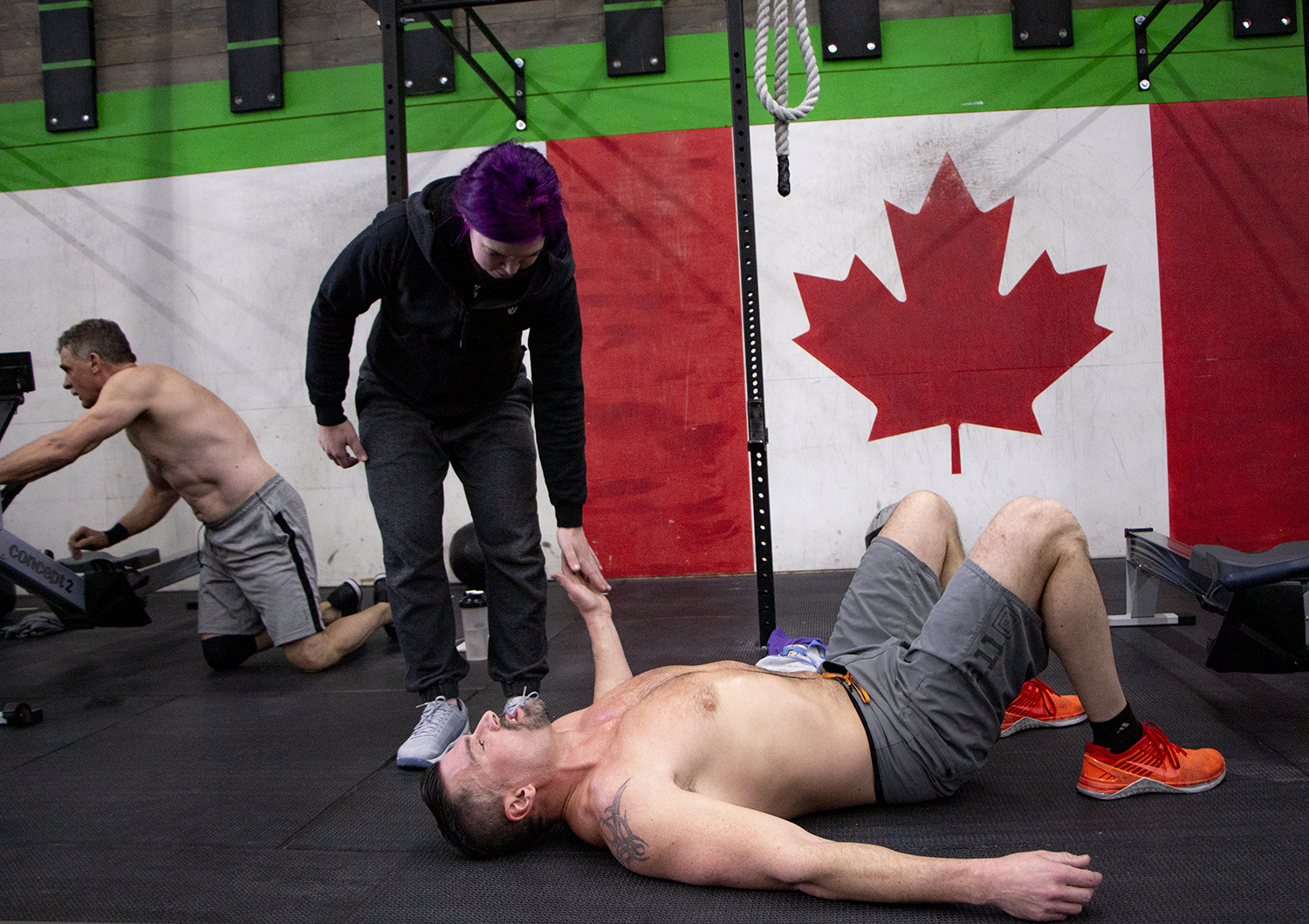Amy Boyd gives Blair Lozza a high-five after completing a workout at CrossFit Framework on Monday morning.
Our bodies – though we all have one, none are created equal.
Like many other controversial, sometimes toxic subjects, our society has slowly, but surely become more accepting of bodies of all shapes and sizes in the past several years.
However, body image still remains a large issue today — 91 per cent of North American women admit to being unhappy with their body, according to dosomething.org.
It’s not just an issue for women either, as 30 per cent of men have also admitted to being dissatisfied with their appearance. In total, body image affects nearly two-thirds of all adults in North America.
Russ Stewart, owner of Lethbridge gym CrossFit Framework, says these trends aren’t going away, despite Canadians being more aware of their bodies than ever before.
“Over 90 per cent of our new clients walk in the door and they already have goals,” Stewart explains. “When I ask them about their goals, the first goal everyone has is aesthetic – ‘I want to look better.’”
Stewart adds negative body image happens on both ends of the spectrum.
“It has moved away from the centre and is now going to the extremes. Whether it be body acceptance or bodybuilders on social media, both lifestyles are unhealthy. They are unsustainable for long periods of time without serious side effects.”
Susan Conconnard, a Mental Health Therapist with Alberta Health Services, says social media has a huge influence on the way we feel about our bodies.
“If you’re constantly looking at social media, it can turn into a form of punishment – especially if you’re trying to acquire a certain look.”
Janet Innes, a colleague of Conconnard, says comparing ourselves to others is human nature.
“We will naturally compare ourselves to what we see… We always seem to come out on the bottom.”
Often, body image issues are the root of a bigger mental disorder such as anxiety or depression.
“It becomes much more than saying, ‘oh I don’t feel good in these pants,’” Connconard explains. “Sometimes, getting out of bed and brushing your teeth is a win for these people.”
When working with clients struggling with body image, both therapists find all of their clients shine in other areas of their life.
“What’s good about them has nothing to do with their weight or their shape,” says Innes. “You don’t want to have (your body) say everything, it’s only one small part of you.”
Another issue surrounding body image is the different ways society approaches weight loss and weight gain.
“When people lose weight, there are often comments about it, like ‘you look great,’” Connconard remarked. “When people gain weight, nothing is said. It’s amiss in our society… maybe we should say nothing at all.”
For Stewart, the societal taboo on commenting on weight leaves him personally frustrated.
“I’ll never degrade someone for their weight, but I feel it’s unhealthy to remain overweight or underweight. If they decide they want to get help, we are here for them.”
Because of the silence surrounding body image, life events are often what finally spur people to make changes.
“I’ve had lots of people come in here that were getting out-ran by their kids and it was their wake-up call. Sometimes it’s more serious, like a stroke. It makes people realize they might die sooner than they should be.”
Stewart adds even though a person may be eating right and attending the gym regularly, focusing too much of their attention onto their appearance or weight can stall their progress.
“My wife is a nutritionist and with some clients she switches her weekly weigh-ins to daily, so they don’t stress about them,” Steward remarks. “Stress raises your cortisol levels and contributes to keeping some weight on.”
In the fitness industry, marketing becomes a unique challenge because of the silence surrounding our bodies.
“We put ourselves out there by saying, ‘If you’re unhappy, we’re here… one hour a day could extend your life by two or three years.”
Connconard and Innes note everyone’s journey through mental illness is different — sometimes it takes years to get comfortable enough to go to a place like the gym.
Lethbridge offers a bounty of gyms within city limits, as well as plenty of walking trails and other outdoor activities. Once someone is comfortable enough to step outside of their comfort zone, the options are plentiful.
Stewart agreed by saying the hardest part for many is just to walk in the door.
“We have programming that works and a community that supports each other. When people are ready to make a change, we’re ready too.”

